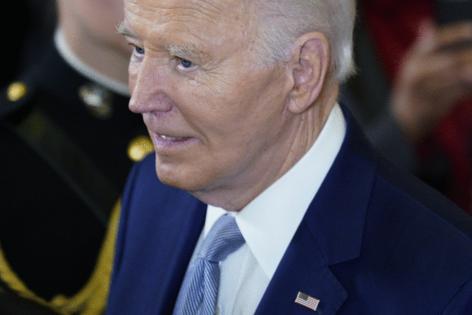What to know about Biden's decision to grant the 'kids-for-cash' judge clemency and the blowback that's followed
Published in News & Features
PHILADELPHIA — President Joe Biden came under fire last week for commuting the remaining sentence of a former Luzerne County judge who was given 17 1/2 years in federal prison for accepting kickbacks to send children to a private prison he helped build.
Biden commuted the sentence of Michael T. Conahan, who was convicted in 2011 for the central role he played in the so-called "kids-for-cash" scandal, last Thursday.
Here’s what you need to know about Biden’s decision to grant clemency to 1,499 people last week, the kids-for-cash scandal that played out near Biden’s home turf, and why Pennsylvania Gov. Josh Shapiro joined critics in slamming Biden’s actions.
How many sentences did Biden commute compared to Trump at the end of his presidency?
Under pressure from criminal justice advocates to pardon more people after pardoning his own son, Biden commuted the remaining sentences of nearly 1,500 people Thursday. All of these commutations were for people who were already living under house arrest, likely placed there during the COVID-19 pandemic.
The White House said it was the most people granted commutations in one day in modern history. Nearly 40 people convicted of nonviolent crimes were also pardoned.
The Biden administration did not research the specifics of Conahan’s case or others, besides that it fit a specific set of parameters, Politico reported last week.
Biden has commuted and pardoned more people than Trump during his first term. Trump granted 143 pardons and 94 commutations, making him among few presidents who chose not to use the extraordinary powers on a grand scale. Trump has promised to use the powers more during his second term, including for those convicted on charges related to the Jan. 6, 2021 attack on the U.S. Capitol.
What is clemency?
Clemency is a special executive power given to presidents to free people from prison. They can commute sentences — wipe out the remainder of a person’s sentence but the conviction remains on their record — or pardon them, where the conviction is removed from their record and rights are restored. Biden has mostly granted commutations thus far.
Presidents often wait until the end of their second term — when there is little political fallout since they are term-limited — to issue pardons and grant clemency. Since Biden ditched his bid for a second term earlier this year, he issued the mass pardons last week and could issue more before Trump retakes the office in January.
What was the ‘kids-for-cash’ scheme and how did it end?
Between 2003 and 2008, Conahan and Mark Ciavarella, his codefendant, funneled thousands of children to the PA Child Care and Western PA Child Care for-profit juvenile detention centers in exchange for $2.8 million in kickbacks. According to a 2010 AP report, the money came from PA Child Care contractor Robert Mericle and co-owner and attorney Robert Powell.
The so-called “kids-for-cash” scandal drew national attention in the early 2010s and is seen as one of the most jarring examples of a breach of judicial ethics in the country’s history. The scheme still haunts the victims, their families, and the Luzerne County community.
The scheme was the subject of a 2013 documentary “Kids for Cash,” in which both of the judges involved in the scandal participated.
Who is Michael Conahan?
Conahan was the president judge of the Luzerne County Court of Common Pleas. He pleaded guilty in 2011 to racketeering conspiracy charges for pulling funding from the county juvenile detention center and accepting kickbacks to send minors to a for-profit facility instead.
Ciavarella, sentenced to 28 years in federal prison, remains in prison and is expected to be released in 2035. Ciavarella had a “zero-tolerance policy” toward juvenile offenders and often put first-time, low-level offenders into the juvenile detention system. His approach was amplified in the years after the Columbine shooting in 1999, in an effort to prevent crime in school.
Conahan, 72, had been serving his sentence at a Florida facility until he was released to home confinement during the COVID-19 pandemic in 2020. He still had at least two years of his sentence remaining that were wiped out as part of Biden’s action on Thursday.
What was Gov. Josh Shapiro’s reaction to Biden’s decisions?
Shapiro, a Democrat, said at an unrelated news conference in Scranton last week that the “kids-for-cash” scandal remains a “black eye on the community” that irreparably harmed children and their families, and Conahan’s sentence was “too light” to begin with.
“The fact that he’s been allowed out over the last years because of COVID, was on house arrest, and now has been granted clemency, I think, is absolutely wrong,” Shapiro said. “He should have been in prison for at least the 17 years that he was sentenced to by a jury of his peers.”
Shapiro, Pennsylvania’s former attorney general who has signed half of the clemency recommendations sent to him by the Board of Pardons, said he studies “every single case that comes across my desk” and takes the governor’s state-level power to commute sentences very seriously.
Biden faced widespread outrage from the scandal’s victims and families, as well as other public officials. Sandy Fonzo, whose son Ed was imprisoned by Ciavarella and died by suicide at age 23, told The Citizens’ Voice of Wilkes-Barre that she was “shocked and hurt.”
“This pardon feels like an injustice for all of us who still suffer,” she added.
_____
(Staff writer Nick Vadala contributed to this article.)
_____
©2024 The Philadelphia Inquirer. Visit inquirer.com. Distributed by Tribune Content Agency, LLC.







Comments